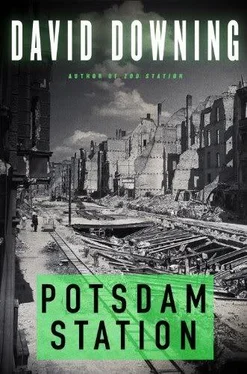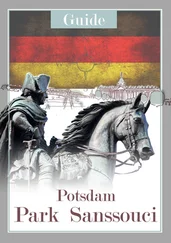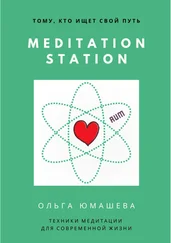David Downing - Potsdam Station
Здесь есть возможность читать онлайн «David Downing - Potsdam Station» весь текст электронной книги совершенно бесплатно (целиком полную версию без сокращений). В некоторых случаях можно слушать аудио, скачать через торрент в формате fb2 и присутствует краткое содержание. Жанр: Шпионский детектив, на английском языке. Описание произведения, (предисловие) а так же отзывы посетителей доступны на портале библиотеки ЛибКат.
- Название:Potsdam Station
- Автор:
- Жанр:
- Год:неизвестен
- ISBN:нет данных
- Рейтинг книги:5 / 5. Голосов: 1
-
Избранное:Добавить в избранное
- Отзывы:
-
Ваша оценка:
- 100
- 1
- 2
- 3
- 4
- 5
Potsdam Station: краткое содержание, описание и аннотация
Предлагаем к чтению аннотацию, описание, краткое содержание или предисловие (зависит от того, что написал сам автор книги «Potsdam Station»). Если вы не нашли необходимую информацию о книге — напишите в комментариях, мы постараемся отыскать её.
Potsdam Station — читать онлайн бесплатно полную книгу (весь текст) целиком
Ниже представлен текст книги, разбитый по страницам. Система сохранения места последней прочитанной страницы, позволяет с удобством читать онлайн бесплатно книгу «Potsdam Station», без необходимости каждый раз заново искать на чём Вы остановились. Поставьте закладку, и сможете в любой момент перейти на страницу, на которой закончили чтение.
Интервал:
Закладка:
'They are,' Russell admitted.
'Yet you are alive,' the Russian noted, as if that should be counted against him.
'As you see.' Russell sneaked a glance at Shchepkin, who was staring into space.
'Give us your report.'
Russell began with the botched landing west of Berlin, avoiding any reference to Varennikov's momentary panic – there was no point in putting Irina's pension at risk. He explained how it had upset their timetable, and resulted in their arriving at the Institute twenty-four hours later than scheduled. He described the successful break-in, and Varennikov's excited reaction to some of the papers.
'He did find something!' Nikoladze exclaimed, leaning forward in his seat. 'Where are these papers?'
'We'll get to that. Let me tell the story.'
Nikoladze gave him a look, but waved him on.
'That was when it all fell apart,' Russell continued. He explained how Kazankin and Gusakovsky had died, then began to blend fact and fiction. 'We spent the whole day hiding in a bombed-out house, and the following night we walked all the way to the Potsdam goods yard. The comrades hid us in an abandoned underground station – we were there for almost a week. And then, four days ago, a rail-mounted gun fell through the ceiling. I wasn't there, but Comrade Varennikov was killed. Since then…'
Neither Russell's subsequent adventures nor his physicist's fate were of any interest to Nikoladze. 'And the papers?' he asked. 'Where are they now?'
'They're safe. Varennikov and I buried them, in case we were stopped and searched.'
' Where did you bury them?' Nikoladze insisted, his voice rising slightly.
Russell took a deep breath. 'Colonel, I don't want to be difficult, but there's a problem here.'
'What sort of problem?
'One of survival. My own, that is. Because I've been wondering what my life will be worth once I tell you where they are.'
Nikoladze was speechless for a long moment. Shchepkin, Russell noticed, was suppressing a smile.
'You will tell me where the papers are,' Nikoladze told him coldly. If the threat was palpable, there was also more than a hint of fear in the Georgian's eyes. He could not afford to fail.
Russell refused to be deflected. 'I would lay bets that Kazankin had orders to liquidate me the moment we reached the goods yard.'
Nikoladze's face confirmed as much. 'He told you that?'
'He didn't need to – you people don't like loose ends. So I have nothing to gain from simply handing you the papers. On the contrary, I would simply be signing my own death warrant.'
Nikoladze snorted, and pulled himself forward. 'You are at our mercy. You're in no position to bargain.'
'Maybe not,' Russell admitted. 'But please, Colonel, I did what you asked me to do. So give me a few minutes. Hear my proposal, and we will all get what we want.'
'We might as well hear what he has to say,' Shchepkin said, speaking for the first time. 'What do we have to lose?'
For a moment Russell thought the Georgian would refuse, but he finally nodded his acquiescence.
'You want the papers,' Russell began, carefully marshalling his argument, 'and you don't want anyone else to know that you've got them. I want safe passage to the American zone for all of my family. My son Paul Gehrts is a prisoner-of-war – he was captured with me in Charlottenburg, but I don't know where he was taken. His uncle Thomas Schade was in the Volkssturm, and he was last seen at Kopenick just outside Berlin, about ten days ago. He was planning to surrender, so you probably have him too. My wife you know about. She has a seven-year-old orphan with her, and a sister named Zarah Biesinger in Schmargendorf. I want them all rounded up and brought here, and then driven to the Elbe.' He took a folded piece of paper from his pocket, and offered it to Nikoladze. 'A list of the names and addresses.'
Nikoladze ignored the outstretched hand. 'Why the American zone?' he asked suspiciously.
'Because Zarah's son and Thomas's wife and daughter are already there, and I want my wife and son to be beyond your reach. If I hold the Soviet Union to ransom, I expect the NKVD to be angry with me. But I don't see why the rest of my family should suffer for my crimes.'
'And the rest of your proposal? I take it there's more.'
'My wife knows a Swedish diplomat here in Berlin. His name is Erik Aslund. He'll travel to the Elbe with the party, see them across, and then report back to me. Once I know they're safe, I'll take you to the papers.'
'And what's to stop us killing you after that?' Nikoladze asked. He was engaged by the logic, Russell realised, which had to be good news.
'Self-interest, I hope. As long as I'm alive, my family will say nothing that could jeopardise my survival, but if I'm dead…' Russell smiled. 'But let's not consider that possibility. Let's be optimistic. Taking my family to the Elbe will cost you a few litres of petrol. You'll get the papers, and no one else will know you have them. None of my family will be able to broadcast the story without incriminating me. And you'll have a lasting hold over me. If you let me go, you can always threaten to expose my involvement in this, and have the Americans hang me for treason. Or you can make use of me. I'm a well-known journalist with a lot of contacts, and I've served you well in the past, as Shchepkin here can testify.'
Nikoladze considered. 'That is all very clever,' he said slowly, 'but direct persuasion still looks the simpler option. And quicker. Or am I missing something?' He glanced at Shchepkin as he said it, and seemed to be challenging them both.
Shchepkin responded. 'It would be simpler, but also more risky. The story would probably get out,' he cautioned. 'If the man died his family would talk, and even if he only disappeared from view, well… And we have no idea who else he might have told, or whether he's left a written account with anyone. He's had several days to set this up. If we do things his way, we still get the papers, and a valuable asset in the Western zone.'
Russell listened gratefully, wondering why he hadn't thought to take such precautionary measures, and marvelling at Shchepkin's quick-wittedness. Here was an asset, the Russian had to be thinking, that only he could control. They would save each other's lives.
Nikoladze was ready to swallow his anger, at least for now. 'Give me the list,' he demanded.
Russell handed it over. The Georgian, for reasons best known to himself, had decided to go along with him. Maybe the NKVD torturers were all fully booked, or he was just a sweetheart in disguise. He might have bought the argument, or at least some of it. Whatever the reasons, he could always change his mind. When he got his hands on the papers, he would still have his hands on Russell.
But the others would be free.
To Russell, the rest of the day seemed endless. He spent several hours in the basement canteen, where all his attempts at idle conversation were either rebuffed or ignored. Back in his room he paced and fretted, or lay on the camp bed and stared at the ceiling. He could sometimes hear guns in the distance, but the building's buzz of activity usually drowned them out.
He eventually fell asleep, and only awoke when sunlight glinted through the boarded-up window. The canteen provided bread and black tea, and a visit to the nearby toilets turned up a bucket of lukewarm water and a paper-thin sliver of soap. The subsequent wash raised his spirits a little, but climbing back into filthy clothes dropped them right back down. He was on his way upstairs when a young NKVD officer intercepted him. 'The people on your list are being brought here,' the young man said. 'They will wait in your room.'
'All of them?' Russell asked, as much in hope as expectation.
'Of course,' the young man answered, as if partial success was an unfamiliar concept. A riotous succession of hurrahs erupted somewhere upstairs, followed by the clinking of glasses. They both looked upwards, and Russell asked if the war was over.
Читать дальшеИнтервал:
Закладка:
Похожие книги на «Potsdam Station»
Представляем Вашему вниманию похожие книги на «Potsdam Station» списком для выбора. Мы отобрали схожую по названию и смыслу литературу в надежде предоставить читателям больше вариантов отыскать новые, интересные, ещё непрочитанные произведения.
Обсуждение, отзывы о книге «Potsdam Station» и просто собственные мнения читателей. Оставьте ваши комментарии, напишите, что Вы думаете о произведении, его смысле или главных героях. Укажите что конкретно понравилось, а что нет, и почему Вы так считаете.












